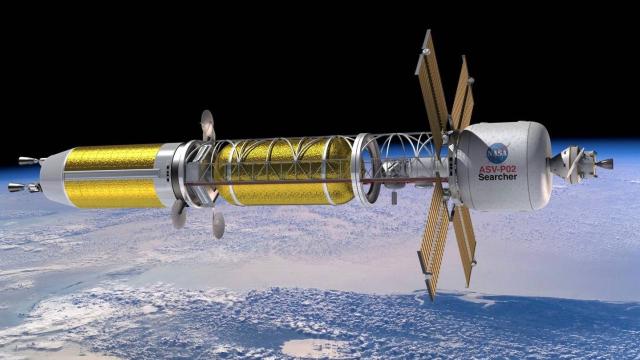Two of the most forward-thinking agencies in the United States are joining forces to foster the development of advanced space propulsion. A fireside chat on the new collaboration is scheduled for Tuesday morning, and you can watch it live right here.
The 2023 American Institute of Aeronautics and Astronautics (AIAA) SciTech Forum is officially underway in National Harbour, Maryland. The theme for this year’s confab is to “explore the frontiers of aerospace,” and it will run from today through to Friday at the Gaylord National Resort & Convention Centre. Forum speakers will touch upon the future of space and planetary exploration, aeronautics, climate research, and Earth sciences, among other topics.
Of note is a panel discussion to be held on Wednesday, January 25 at 2:00 a.m. AEDT, during which officials from NASA and the Defence Advanced Research Projects Agency, or DARPA — the Pentagon’s secretive research wing — will “discuss a collaboration between the agencies to advance space propulsion technologies for both civilian and defence efforts,” as the AIAA describes the fireside chat.
The session will be made available on NASA TV, the NASA app, and the agency’s website. You’ll also be able to watch it at the live feed above.
NASA administrator Bill Nelson will deliver a keynote address, after which Steven Howe, the former director of the Centre for Space Nuclear Research (CSNR), will moderate a two-person panel consisting of NASA deputy administrator Pam Melroy and DARPA director Stefanie Tompkins. Melroy has a connection with DARPA, as she served as the agency’s deputy director of its tactical technology office from 2013 to 2017.
The extent to which the panelists will delve into the details is not clear, but it’d been great to get some concrete information about the types of advanced space propulsion technologies that NASA and DARPA will seek to develop, along with descriptions of possible future applications. Updates about ongoing projects, such as spacecraft powered by nuclear thermal propulsion, would likewise be welcomed. NASA’s Innovative Advanced Concepts (NIAC) program recently granted Phase I status and $US175,000 ($242,935) in funding to a University of Florida team working on a nuclear engine concept that could take a spacecraft to Mars in just 45 days.
This should make for a fascinating conversation, and I’m looking forward to learning about the collaboration and how the two agencies plan to work together.
More: Planes on Titan and Pipelines on the Moon: NASA Considering Some Wild Future Tech
